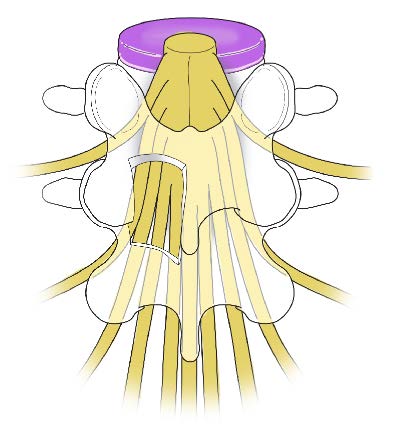Neurosurgery
From the 30th November the neurosurgery referrals should be made online via Patient Pass.
Check our guide on how to use the system:
- Neurosurgery
About us
The Department is based at Lancashire Teaching Hospitals NHS Foundation Trust situated on the north side of Preston with easy access from the M6 and M55 motorways. The Unit provides a service to Lancashire and Cumbria containing the health districts of Preston, Chorley and South Ribble, Blackpool, Blackburn, Burnley, Lancaster and Barrow
The Unit consists of 61 acute beds based primarily on three wards:
Ward 2A
Ward 2B
Ward 2CChildren are admitted to the Paediatric Unit (Wards 8 and 5), though the majority of Paediatric Neurosurgery is done at the Royal Manchester Children’s Hospital. A paediatric clinic is held on-site. There are 4 dedicated operating theatres (Theatres 7, 8, 11 and 12) with modern equipment for neurosurgical use, Zeiss microscopes, BrainLAB image-guidance systems, AV aids, ultrasonic aspirators, intra-operative ultrasound and cranial / trans nasal endoscopy.
Nurses
Our nursing team consists of very dedicated nurses whose experience is paramount in delivery of safe
neurosurgical care to our patients.
There is a team of experienced trainee doctors in the department to provide excellent care to the
patients.
ResearchDepartment is very active in research and would appreciate active participation or help from the
patients or their family and friends.
Our current research projects are on –
Brain tumours
Normal Pressure hydrocephalus
Spinal surgery outcomes.Contact
Royal Preston Hospital switch board - 01772 716565
Sister Tracey Shamsuddin Pre-op nurse - 01772 522656
Ward 2a - 01772 522217
Ward 2b - 01772 522713
Ward 2c - 01772 528162
Sources of further information:
- Commonly asked questions
How long will I stay in Hospital?
The length of time you stay in hospital depends on the surgical procedure that you have had and can be 1-5 days. It depends on how your surgery goes your health and personal circumstances. When you attend the pre-op assessment you will be given a rough idea regarding your length of stay. However, your surgeon will make a final decision after the operation.When can I walk?
You will usually be encouraged to begin walking the morning after your surgery.
How long should I wait before I can drive?
The recommended time is 3-4 weeks before driving a car. This may vary depending on your surgery and progression during rehabilitation.
What should I bring into Hospital?
Be sure to bring any medications that you may need during your stay. Leave valuables at home. Bring the usual overnight belongings including nightdress or pyjamas, walking or dressing aid if used, dressing gown, books/magazines, slippers or non-slip shoes, toiletries, tissues or handkerchiefs, spectacles and loose change.
You should try and avoid over packing though as only a small locker is provided.
Can I eat and drink the day before?
Yes. The time to stop drinking and eating will be planned once the theatre list is written. This is usually 5pm the evening before your operation day.
When can I have a shower after my surgery?
You can have a shower the day after your surgery. If your dressing gets wet, a new one can be applied
How soon can I go back to work?
This is assessed on a patient by patient basis. However, you can usually return to work after six to eight weeks. But you may need to stay off work for three months if your work involves a lot of standing or lifting.
What are the risks?
All the risks will be discussed with you prior to your surgery and although they are not common you should be aware that there is the potential for them to occur. These include risk from anaesthesia, small risk of increased pain in back or leg, risk of injury to the nerves causing weakness or numbness in legs, bladder, bowel or sex organs, leak of spinal fluid, infection and blood clots.
If you have any further questions, please write them down and bring with you to the pre-op clinic and these can be answered then.
- Neurosurgery Pre Op
The purpose of the pre-op appointment is to assess your general health before having an anaesthetic and undergoing surgery.
You will normally be given an appointment to attend the clinic 2-4 weeks before your operation.
The appointment will normally take about 30-60 minutes.
However, you should allow approximately two hours for your appointment as you may need to undergo certain tests in other departments of the hospital.
Please bring all the medication you are currently taking as well as a medical alert card or details of a medical implant if you have one. - Neurosurgery Post Op
Waking up
When you wake up after your surgery, your back may feel sore and you will probably be attached to one or more tubes, including:
- an intravenous drip to make sure you do not get dehydrated,
- a drain to take away any fluid from your wound,
- a catheter if you are having difficulty urinating, and
- a pump to deliver painkillers directly into your veins every few hours.
The tubes are only usually attached for a short while after your operation.
Discomfort
Immediately after surgery, you will have some pain in and around the area of your operation. You will be given pain relief to make sure you are comfortable and to help you move. The original pain in the leg usually improves immediately, but if it does not, tell the nurses and your doctor.
A very small number of people experience difficulty passing urine after the operation. This is usually temporary, but in rare cases complications, such as nerve damage, may cause the legs or bladder to stop working properly. It is important to tell your doctor and nurses immediately if you experience problems.
It can take up to six weeks to get over the general pain and tiredness following your operation.
Wound
You will have stitches and or clips to repair any cuts or incisions made during your operation. Deep stitches beneath the skin will dissolve and do not need removing. Stitches or clips used on your skin will be removed 7-10 days after your operation. You will be given an appointment to have these removed before you leave hospital.
Your wound will be covered by a simple adhesive dressing, like a large plaster. When you wash, be careful not to get your dressing wet. Dressings may be given to you on discharge from the ward to use if your dressing gets wet. After having your stitches out, you will not need a dressing and will be able to bath and shower as normal.
Discharge
Your discharge from hospital will depend on your progress but may be as early as 24 hours after your operation. It is important to consider making arrangements for transport and everyday things like shopping, particularly if you live alone. Support can be arranged upon discharge but this will be done on an individual basis depending on your circumstances. More information about pain relief will be given to you when you are discharged. If you experience any problems, you should contact your G.P. A follow up appointment will be given to you for between 6-8 weeks
- About the team
Consultants
Click on a consultant to see more information.
- Relevant Leaflets/Documents/Links
Here are some useful links to information on other sites which you may find helpful
Preston Skull Base Group
Preston Skull Base Group is a multi-disciplinary team concerned with the evaluation and treatment of patients with disorders of the skull base.
Examples of such disorders include acoustic neuroma (vestibular schwannoma), meningoma, pituitary adenoma, head & neck cancers (of the paranasal sinuses, temporal bone, parotid gland), Arnold-Chiari malformation and trauma.
Preston Skull Base Group has on-site access to nasal endoscopy, orbital surgery, maxilofacial surgery, plastic surgery and radiotherapy.
The group runs joint clnics and supports the running of a skull base Multi Disciplinary Team (MDT) meeting and a Pituitary MDT meeting, each of which run twice a month to discuss individual patient cases. The focus of the group is on patient choice and quality of life.
- Members of the Preston Skull Base Group
Members of the Preston Skull Base Group
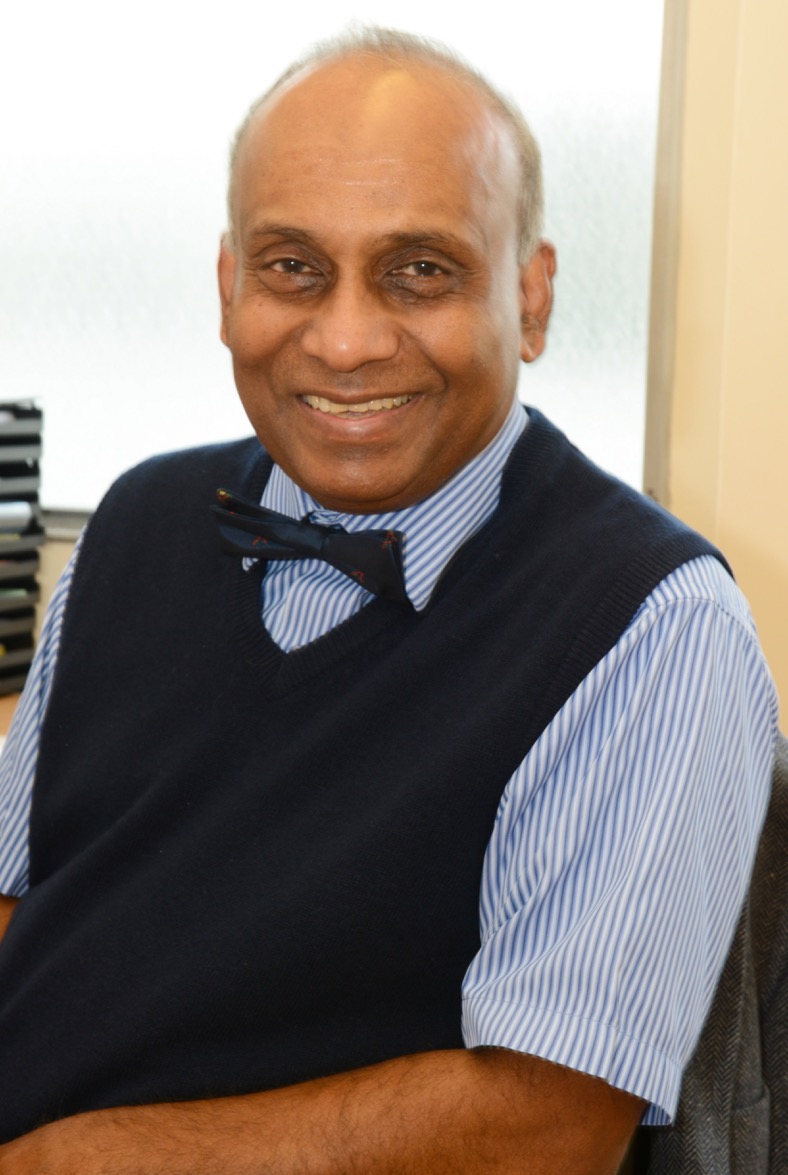 Neurosurgery:
Neurosurgery: Mr G. Roberts (Skull Base MDT Lead)
Prof N. Gurusinghe
Mr A. Golash
Dr A. AlaladeOtology:
Mr A. Pahade
Head & Neck /Skull Base Endoscopy:Mr J. De Carpentier
Mr V. VaradarajanMaxillofacial Surgery:
Mr S. Akhtar
Mr K. AnjumOrbital Surgery:
Mr M. Sira
Mr V. PatelRadiotherapy:
Dr C. Lim
Plastic Surgery:
Mr J. Srinivasan
Endocrinology:
Dr S. Howell
Dr K. KaushalFacial Prosthetics:
Mrs A. Fow
Mrs R. ScarrottSpecialist Nurses:
Ms J. Tate (Surgical)
Ms J. Law (Surgical)
Ms S. Wilson (Endocrine)
Mr A. Fishburm (Head & Neck)Contact details
Mr G. Roberts
Consultant Neurosurgeon,
Department of Neurosurgery,
Royal Preston Hospital,
Sharoe Green Lane,
Preston,
Tel: (01772) 522583
Fax: (01772) 522093 - Skull Base Guidelines
- Skull Base Pathways
Spine
- Lumbar laminectomy
Lower back pain and leg pain are extremely common symptoms experienced with up to 5 million people seeing their G.P each year about back pain.
There are many causes of back and leg pain including muscle pain, normal wear and tear and problems with the spine. Problems with the spine can sometimes be corrected with surgery, which is the situation in your case.
The spine is made up of several bones running from your neck and down to the level of the hips as well as ligaments which help keep the bones in place. Also between each bone of the spine is a disc made of cartilage which acts as support and as a shock absorber. The spine acts to support your body weight and help with movement, as well as protect the spinal cord, which is a collection of nerves that carries information to and from the brain, helping with movement and sensation. If there is any pressure on the spinal cord, it can cause pain in the back and legs, and sometimes weakness of the muscles. Two of the causes of pressure are Spinal Stenosis and Disc Prolapse.
Normal Anatomy
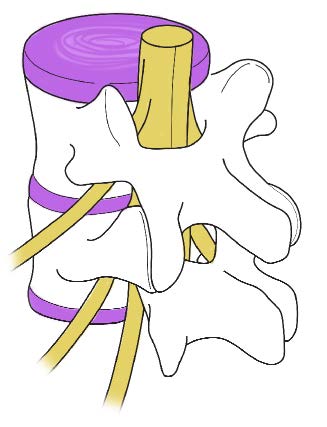
Spinal stenosis
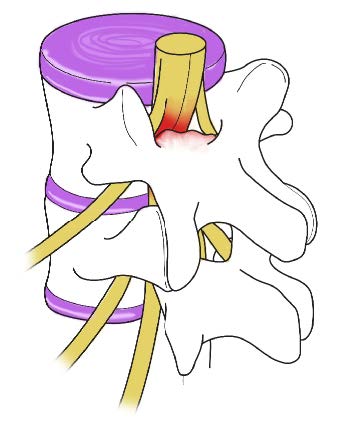
Decompressed nerve
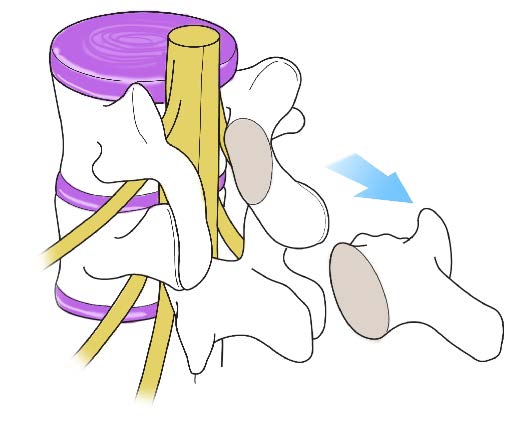
- Spinal disc prolapse & spinal stenosis
Lower back pain and leg pain are extremely common symptoms experienced with up to 5 million people seeing their G.P each year about back pain. There are many causes of back and leg pain including muscle pain, normal wear and tear and problems with the spine. Problems with the spine can sometimes be corrected with surgery, which is the situation in your case.
The spine is made up of several bones running from your neck and down to the level of the hips as well as ligaments which help keep the bones in place. Also between each bone of the spine is a disc made of cartilage which acts as support and as a shock absorber. The spine acts to support your body weight and help with movement, as well as protect the spinal cord, which is a collection of nerves that carries information to and from the brain, helping with movement and sensation. If there is any pressure on the spinal cord, it can cause pain in the back and legs, and sometimes weakness of the muscles. Two of the causes of pressure are Spinal Stenosis and Disc Prolapse.
Spinal stenosis

Spinal stenosis is the narrowing of the central spinal canal which is the space where the spinal cord runs or side root canals of the spine. This narrowing causes pressure on the nerves in the canal, leading to pain, usually in the lower back and legs. It is called Lumbar stenosis when this happens in your lower back region
Causes of spinal stenosis include:
* Age-related degeneration of the spine. The main cause of spinal stenosis is natural age-related wear and tear.
This is often linked to osteoarthritis. As the vertebrae (bones) of the spine begin to weaken and deteriorate,
they rub against each other. This causes bony growths called bone spurs, which can cause the spinal canal to
narrow.
* Changes in the ligaments of the spine. Like the bones of your spine, the ligaments in your back degenerate
over time and can become stiff and thick. This loss of elasticity can have the effect of narrowing your spinal canal
Slipped (herniated) disc/ Disc Prolapse
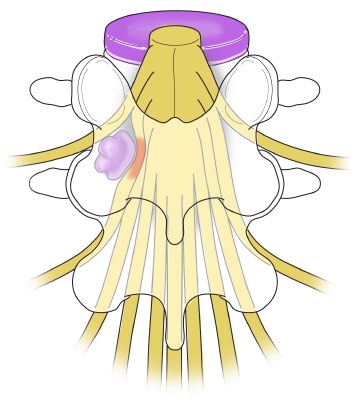
A slipped or herniated disc is when the tough coating of a disc in your spine tears, causing the jelly-like filling to seep out. The torn disc can press on the surrounding nerves causing pain in your back and legs.
A slipped disc can happen at any age, but is more common in people between 20 and 40 years of age. It is usually caused by a combination of minor degeneration in the disc combined with trauma. The trauma can be minor, such as a cough or sneeze.
A slipped disc can press on the nerve sac in the spinal canal causing back pain, or on the surrounding nerves causing pain in the back and legs. It is known as lumbar disc prolapse when this happens in your lower back region.
- Lumbar disectomy
Lower back pain and leg pain are extremely common symptoms experienced with up to 5 million people seeing their G.P each year about back pain.
There are many causes of back and leg pain including muscle pain, normal wear and tear and problems with the spine. Problems with the spine can sometimes be corrected with surgery, which is the situation in your case.
The spine is made up of several bones running from your neck and down to the level of the hips as well as ligaments which help keep the bones in place. Also between each bone of the spine is a disc made of cartilage which acts as support and as a shock absorber. The spine acts to support your body weight and help with movement, as well as protect the spinal cord, which is a collection of nerves that carries information to and from the brain, helping with movement and sensation. If there is any pressure on the spinal cord, it can cause pain in the back and legs, and sometimes weakness of the muscles. Two of the causes of pressure are Spinal Stenosis and Disc Prolapse.Normal anatomy
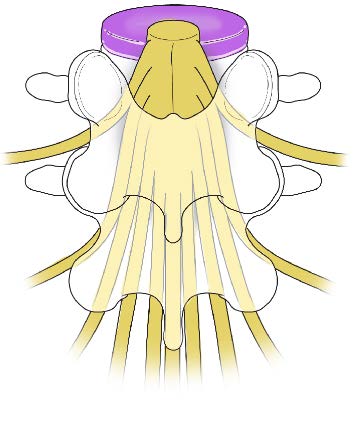
Ruptured disc
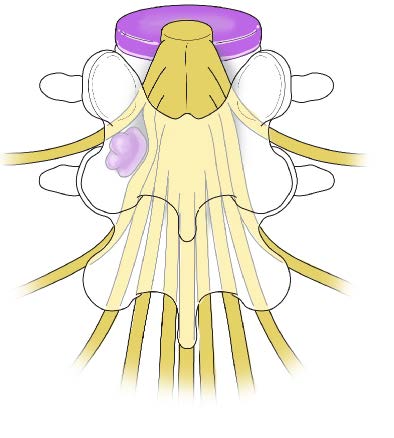
Removal of ruptured region of disc
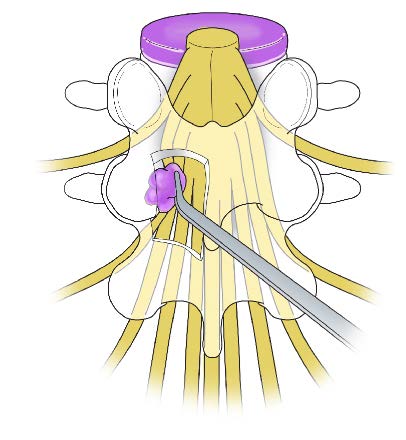
Decompressed nerve
